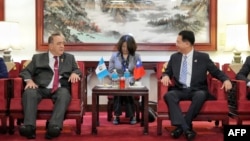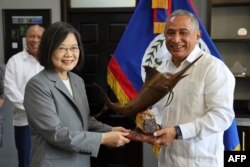Guatemalan President Alejandro Giammattei arrived in Taiwan on Monday to reinforce diplomatic ties with the self-ruled island, on a visit that has drawn China's ire.
The Central American nation is one of the few remaining countries to recognize the sovereignty of Taiwan, a list that has shrunk in recent years as Beijing moves to isolate Taipei on the international stage.
China considers democratic Taiwan part of its territory to be retaken one day and does not allow other countries to recognize both Beijing and Taipei.
Images released by Taiwan's Foreign Ministry on Monday showed Giammattei being escorted by Taiwanese Foreign Minister Joseph Wu upon arriving at Taoyuan International Airport.
Before leaving for Taipei, Giammattei said he was making the trip to send a "clear message that countries have a right to self-governance."
During his visit Monday through Thursday, Giammattei is scheduled to address the congress of Taiwan and visit a technology company in Taichung, south of Taipei. He is also due to attend an event promoting Guatemalan coffee, according to the Taiwanese president's office.
Beijing on Monday said switching recognition to China — a major trading partner for the Central American nation — was "in line with the fundamental interests of Guatemala and the aspirations of its people."
"Taiwan's independence and secessionist movement goes against the tide of history and is nothing but a self-deceiving trick by the Democratic Progressive Party authorities," Foreign Ministry spokesperson Mao Ning told reporters. "It cannot stop the historical trend of China's inevitable reunification."
Giammattei's visit comes after a trip earlier this month by Taiwan's President Tsai Ing-wen to Guatemala and Belize — the only other Central American country to retain diplomatic ties with Taiwan since Honduras shifted its allegiance to China last month.
On her way back to Taipei, Tsai stopped in the United States to meet House Speaker Kevin McCarthy.
In response, China staged three days of military exercises simulating targeted strikes and a blockade of the island.
Latin America has been a key diplomatic battleground for China and Taiwan since the two split in 1949 after a civil war.
Beijing has spent decades convincing Taipei's diplomatic allies to switch sides, gaining nine since Tsai took office in 2016.
Taiwan's 65-year-old ties with Paraguay are also at risk, with opposition candidate Efrain Alegre reportedly saying he would switch recognition to Beijing if elected in presidential elections on April 30.





